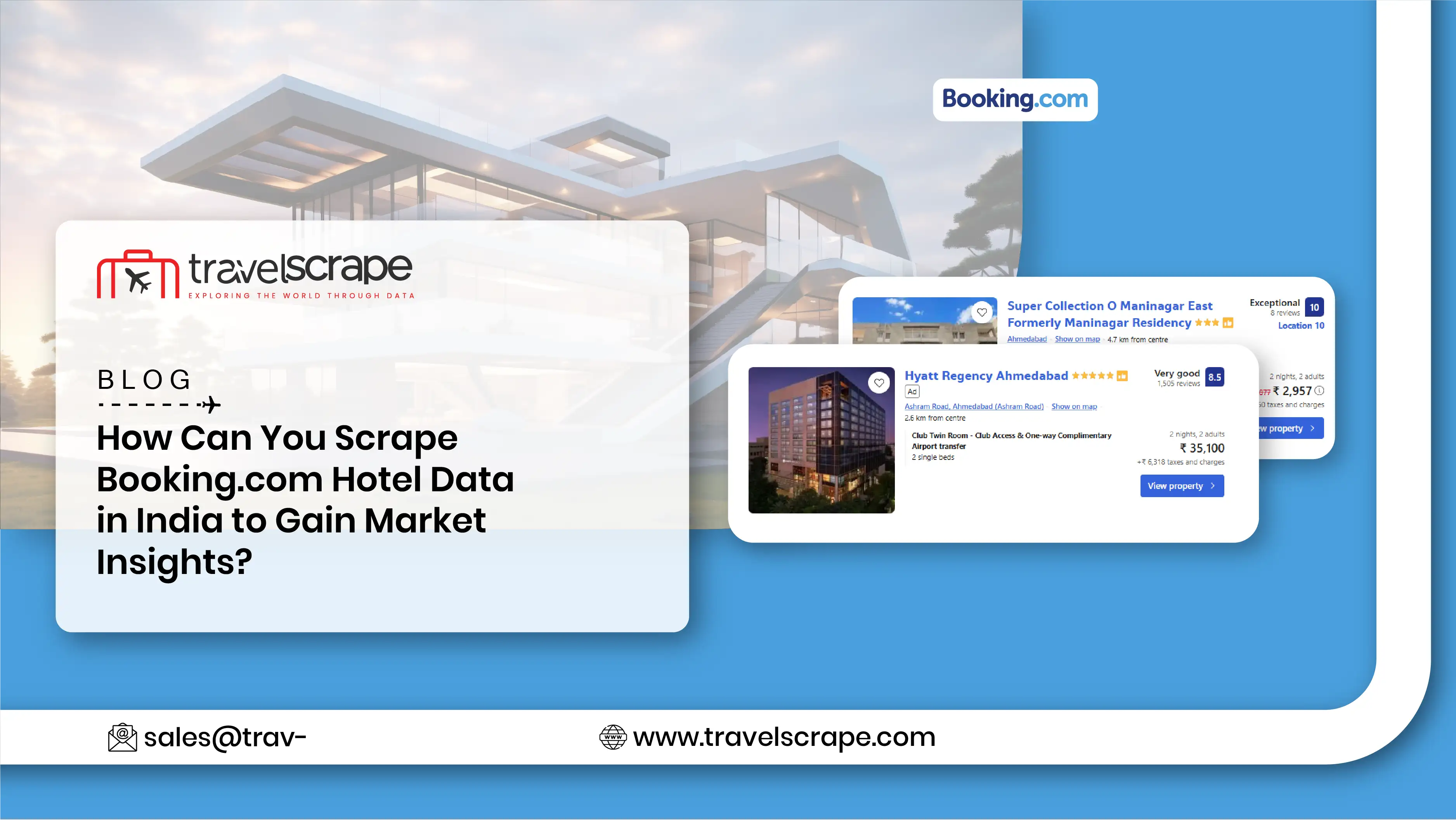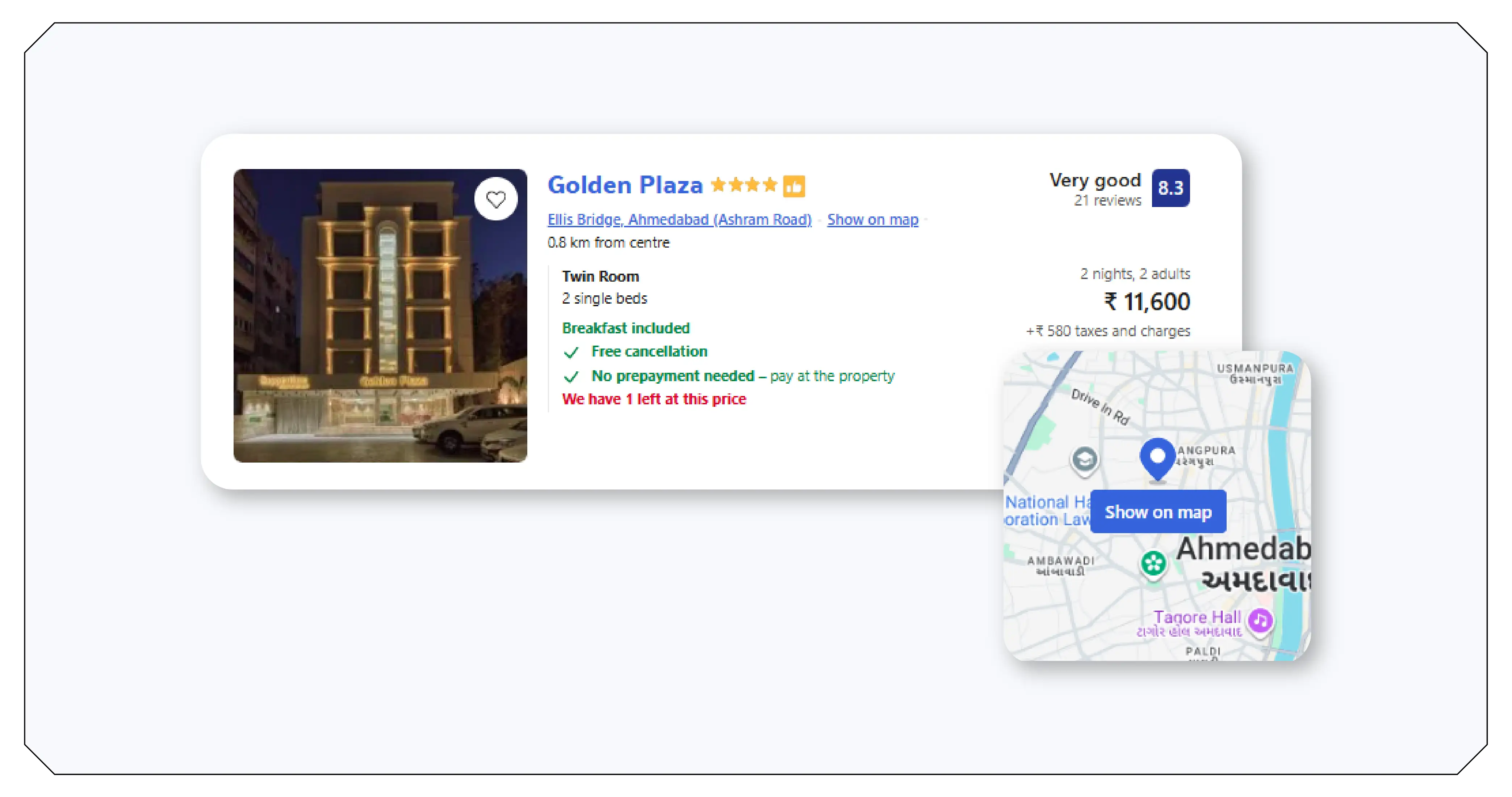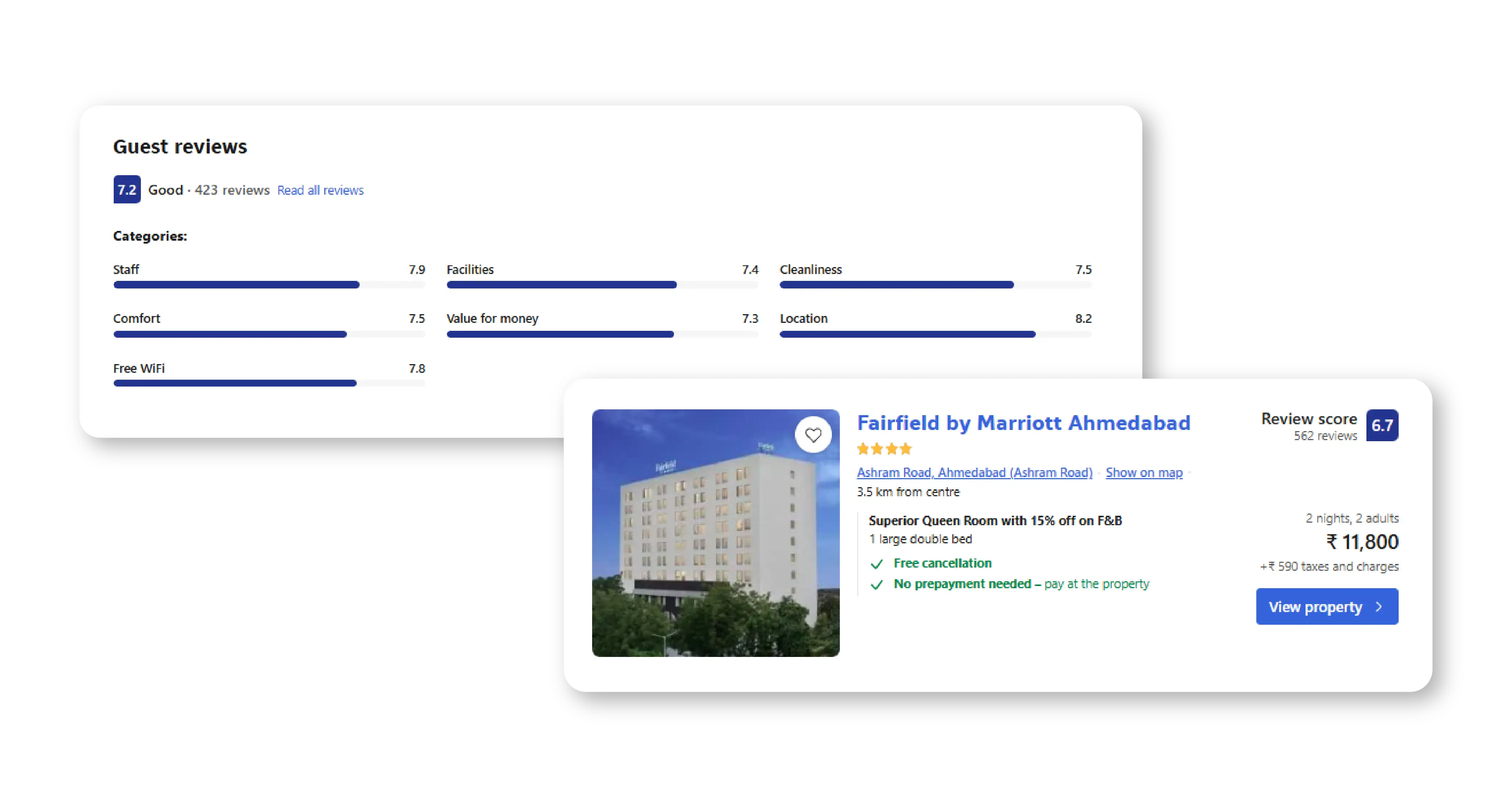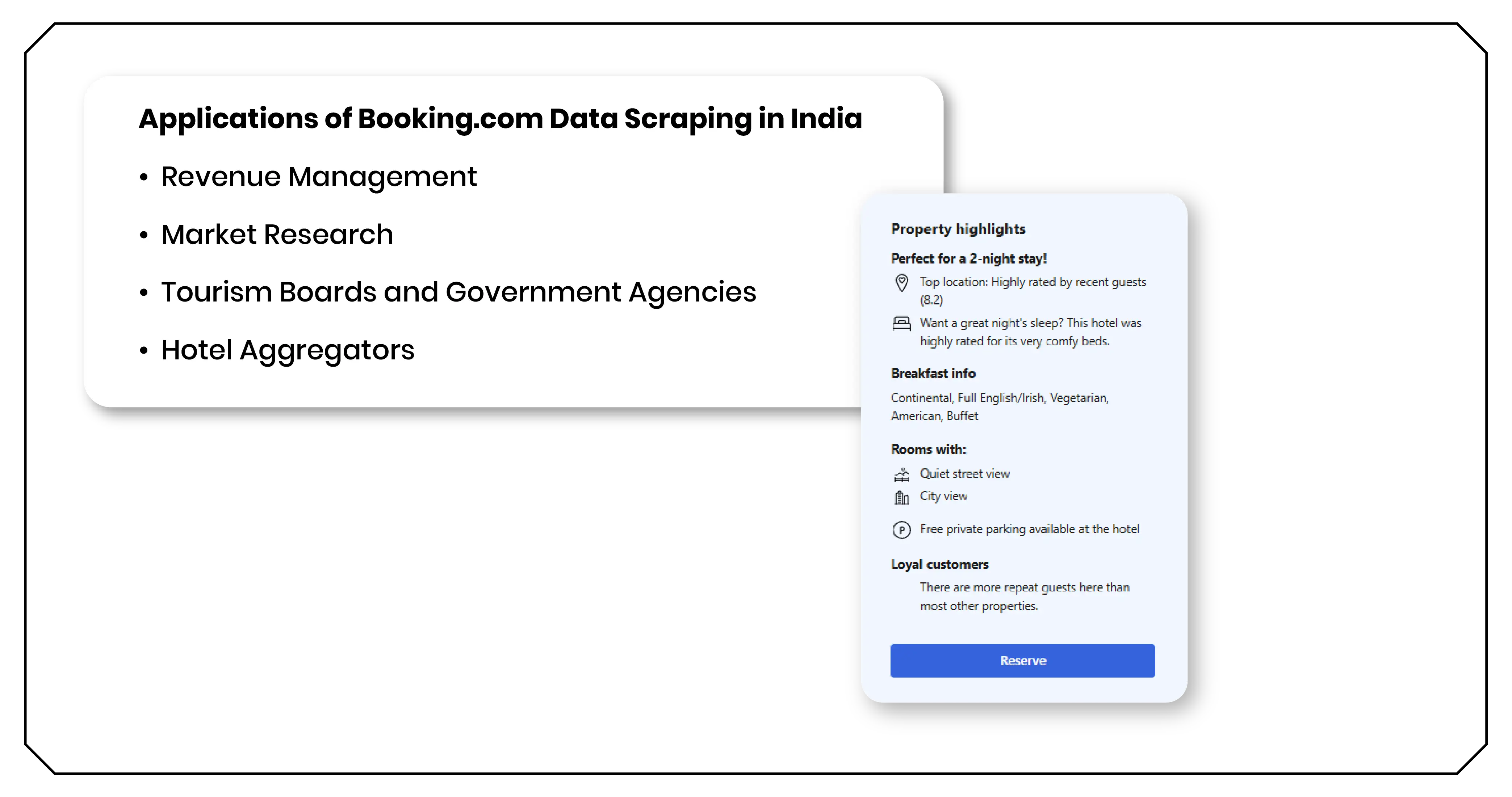How Can You Scrape Booking.com Hotel Data in India to Gain Market Insights?

Introduction
India’s hospitality industry is one of the fastest-growing sectors globally, with millions of travelers booking hotels online daily. To stay ahead in this highly competitive environment, data-driven insights are essential.
One of the most effective methods to access these insights is to Scrape Booking.com Hotel Data in India, allowing businesses to extract structured data about hotels, prices, ratings, and guest feedback in real time.
With the growing complexity of the hotel booking ecosystem, travel companies, data analysts, and market researchers are turning to Hotel Data Scraping Services to make sense of massive datasets from leading platforms like Booking.com. This empowers them to identify price variations, analyze occupancy trends, and track customer sentiment with precision.
Furthermore, organizations can now Scrape Booking.com Hotel Data India for Market Insights to understand traveler preferences, monitor hotel performance, and evaluate regional tourism demand. By analyzing this data, businesses gain actionable intelligence to enhance their marketing strategies, optimize revenue models, and forecast market opportunities more accurately.
The Role of Booking.com in India’s Hospitality Market

Booking.com is one of the largest online hotel booking platforms globally, listing millions of properties across cities, towns, and tourist destinations in India. From budget stays to luxury resorts, Booking.com caters to every segment of travelers. For analysts, this diversity presents an unmatched opportunity to extract and analyze extensive hotel datasets.
By scraping Booking.com hotel listings in India, businesses can collect valuable information such as:
- Hotel names, categories, and locations
- Room rates and promotional discounts
- Real-time availability and booking conditions
- Customer ratings and reviews
- Amenities and facilities offered
- Geographical distribution of hotels across cities
When compiled and analyzed, this data provides deep Hotel Data Intelligence, helping businesses understand emerging travel trends and design targeted strategies.
Why Businesses Need Booking.com Hotel Data Scraping?
The travel and hospitality sector thrives on real-time data. Hotel prices fluctuate frequently based on demand, seasonality, events, and even weather. Relying on static data or manual research no longer suffices.
Through automation, businesses can Scrape India Booking.com Hotel Prices and Availability and stay updated with live market conditions. The insights derived from such datasets help various stakeholders, including:
- Travel Aggregators: To benchmark prices and improve package competitiveness.
- Hotel Chains: To track competitors’ pricing and availability trends.
- Market Researchers: To analyze travel behavior and occupancy rates.
- Revenue Managers: To optimize pricing models using real-time market data.
- Investors: To identify high-performing cities and properties for expansion.
The ability to capture and interpret data dynamically gives organizations a significant competitive edge in India’s rapidly evolving hospitality market.
What Kind of Data Can Be Scraped from Booking.com?
Booking.com contains a wealth of data points that can be extracted using modern scraping techniques. Businesses can capture the following details:
- Hotel name, category (budget, 3-star, 5-star)
- City and location coordinates
- Room prices (daily, weekly, monthly)
- Availability status and seasonal changes
- Amenities (Wi-Fi, breakfast, parking, etc.)
- Cancellation policies and offers
- Guest ratings and detailed reviews
By using advanced tools for Web Scraping Booking.com Hotels Data, companies can automate the process of collecting these parameters at scale. This allows for the creation of structured databases that serve as the foundation for competitive and predictive analytics in hospitality.
Benefits of Booking.com Hotel Data Scraping

A. Price Comparison and Benchmarking
Scraping data enables businesses to compare hotel prices across different cities or
competitors. They can identify pricing gaps, adjust offers, and position their services
more effectively in the marketplace.
B. Market Demand Forecasting
Analyzing occupancy rates and room availability helps predict demand surges during
festivals, holidays, or local events. This data is crucial for dynamic pricing
strategies.
C. Customer Experience Improvement
With the ability to Extract Real-Time Booking.com Hotel Ratings India, hoteliers can
monitor customer satisfaction levels and respond proactively to negative feedback.
D. Promotional Analysis
Scraped data allows businesses to track special deals and discounts offered by
competitors. This helps in optimizing marketing campaigns and staying competitive in
pricing.
E. Regional Tourism Insights
By studying city-specific booking patterns, businesses can identify which regions are
witnessing higher tourist activity and allocate resources accordingly.
How the Scraping Process Works?
Scraping Booking.com data involves using specialized crawlers or APIs that navigate through hotel listings and extract structured information. Here’s how the process typically unfolds:
- Data Source Identification: Define which cities, hotel categories, or date ranges to target.
- Crawler Setup: Configure scripts to collect data fields like prices, reviews, and availability.
- Data Extraction: Automated bots collect relevant data from Booking.com’s publicly available pages.
- Data Cleaning: Remove duplicates, filter irrelevant entries, and structure the data.
- Data Storage and Analysis: Store the dataset in databases for analytical use, visualization, or integration with BI tools.
Modern frameworks like Scrapy, Selenium, and BeautifulSoup are commonly used for large-scale scraping, while API-based approaches ensure higher reliability and compliance.
Applications of Booking.com Data Scraping in India

1. Revenue Management
Revenue managers can monitor competitors’ rates and make real-time pricing adjustments
to maximize occupancy and profitability.
2. Market Research
Research firms use Booking.com datasets to analyze traveler behavior, preferred
amenities, and seasonal travel trends.
3. Tourism Boards and Government Agencies
Authorities can study hotel distribution, occupancy rates, and tourism growth patterns
to plan better infrastructure.
4. Hotel Aggregators
Travel platforms can use scraped data to build competitive pricing engines, ensuring
their customers always get the best rates.
5. AI and Predictive Analytics
Machine learning models can be trained on scraped data to forecast booking demand,
pricing changes, and review sentiment over time.
Tracking Reviews and Sentiments
Customer reviews are one of the richest data sources for understanding traveler expectations. Using scraping tools, analysts can collect thousands of guest reviews from Booking.com for sentiment analysis.
Scraping Booking.com India Hotel Reviews and Booking Data allows businesses to understand what customers like or dislike about specific properties or destinations. Sentiment classification (positive, negative, or neutral) helps identify pain points and improvement areas.
The compiled Booking.com Guest Reviews Dataset can reveal patterns in customer preferences, highlight service gaps, and inspire marketing strategies based on genuine feedback trends.
The Role of Automation in Data Accuracy
One of the key challenges in the travel industry is that hotel data changes rapidly. Prices may vary by the hour, rooms may sell out, and promotions come and go. Manual monitoring cannot keep pace with such volatility.
Automation ensures that data is extracted regularly and accurately. Real-time scraping tools can update pricing and availability data multiple times per day, ensuring that your datasets reflect current market conditions.
Through automation, you not only save time but also ensure consistency and precision in data gathering — the foundation of reliable Hotel Data Intelligence.
How to Ensure Ethical and Legal Compliance?
While scraping public data is a powerful practice, it’s crucial to follow ethical and legal standards. Always extract only publicly available information, respect robots.txt policies, and comply with data privacy laws such as India’s DPDP Act and global GDPR norms.
Partnering with professional Hotel Data Scraping Services providers ensures compliance, reliability, and secure data management. Expert teams employ responsible scraping techniques that safeguard both user data and business integrity.
Integrating Booking.com Data with Business Intelligence Tools
Once the data is extracted, the next step is analysis. Businesses can integrate scraped data with visualization platforms like Tableau, Power BI, or Google Data Studio to monitor:
- City-wise price variations
- Occupancy rates
- Review trends
- Customer ratings distribution
- Demand forecasts
When combined with internal business metrics, these insights drive informed decision-making and strategic growth in a competitive market.
Overcoming Challenges in Hotel Data Scraping
Despite its benefits, scraping hotel data comes with certain technical challenges:
- Dynamic Content: Booking.com uses JavaScript-heavy pages that require headless browsers for extraction.
- Anti-bot Mechanisms: Rate limiting or CAPTCHA challenges may temporarily block automated scrapers.
- Data Volume: The vast number of listings requires scalable cloud storage and efficient pipeline management.
- Localization: City names and currencies vary; scrapers must handle localization and conversion correctly.
With advanced techniques like proxy rotation, API integration, and asynchronous data collection, these hurdles can be managed efficiently.
Building Predictive Market Models
Once you have a steady stream of Booking.com data, it can be used to build predictive models that forecast future market behavior. For example:
- Predicting room rate changes before peak seasons
- Forecasting occupancy rates during holidays
- Identifying underperforming properties or locations
These models rely heavily on historical pricing and review data, making consistent scraping an invaluable asset for hotels, travel startups, and data analytics firms.
The Future of Data-Driven Hospitality in India
India’s tourism sector is expected to grow exponentially, with domestic and international travelers driving new demand across destinations. To capitalize on this growth, data-driven strategies are becoming the backbone of the hospitality industry.
Businesses that regularly scrape Booking.com and analyze datasets can anticipate demand trends, adapt pricing strategies, and enhance their online reputation management.
Automation, AI, and Web Scraping Booking.com Hotels Data will continue to evolve, helping organizations derive deeper insights and operational efficiencies in the hospitality domain.
Case Example: How Businesses Use Booking.com Data
Imagine a travel analytics startup that collects hotel data from Booking.com every 12 hours across major Indian cities. With this data, they can:
- Compare hotel pricing trends weekly and monthly.
- Identify which cities experience higher occupancy during weekends.
- Analyze customer review patterns to understand satisfaction levels.
- Predict when to promote travel packages for maximum conversions.
Such a data-backed approach leads to improved pricing intelligence, customer targeting, and overall business growth.
How Travel Scrape Can Help You?
1. Real-Time Price and Availability Tracking
We help you monitor hotel prices, room availability, and seasonal rate changes in real
time, enabling smarter pricing strategies and competitive benchmarking across multiple
locations.
2. Competitor and Market Analysis
Our scraping services collect comprehensive hotel listings, ratings, and promotions from
Booking.com and other platforms — helping you compare competitors, identify trends, and
optimize your business positioning.
3. Review and Sentiment Analysis
We extract thousands of customer reviews to analyze guest satisfaction, service quality,
and reputation trends — empowering you to improve customer experience and brand trust.
4. Demand Forecasting and Revenue Optimization
By analyzing occupancy rates, booking frequency, and traveler behavior, our Hotel Data
Scraping Services help forecast demand patterns and enhance revenue management
strategies.
5. Automated Data Intelligence for Decision-Making
We deliver clean, structured, and ready-to-use hotel datasets that integrate with your
BI tools — giving you powerful insights for marketing, pricing, and expansion planning.
Conclusion
As India’s hotel and travel landscape becomes more competitive, businesses must leverage real-time insights to stay ahead. The ability to collect and analyze hotel data at scale is no longer optional — it’s essential.
With Web Scraping Booking.com India Hotel Market Price Trends, organizations can uncover valuable intelligence about pricing dynamics, customer sentiment, and regional performance. This knowledge empowers them to act strategically in a volatile market.
Moreover, through automation and integration, companies can Extract Booking.com Hotel Listings India via API, ensuring seamless data access for real-time analysis.
When structured and analyzed, this data forms a powerful Booking.com Hotel Room Rates Dataset, driving smarter decisions, enhanced traveler experiences, and profitable outcomes in India’s thriving hospitality sector.
Ready to elevate your travel business with cutting-edge data insights? Scrape Aggregated Flight Fares to identify competitive rates and optimize your revenue strategies efficiently. Discover emerging opportunities with tools to Extract Travel Website Data, leveraging comprehensive data to forecast market shifts and enhance your service offerings. Real-Time Travel App Data Scraping Services helps stay ahead of competitors, gaining instant insights into bookings, promotions, and customer behavior across multiple platforms. Get in touch with Travel Scrape today to explore how our end-to-end data solutions can uncover new revenue streams, enhance your offerings, and strengthen your competitive edge in the travel market.